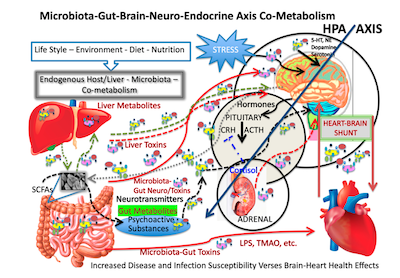“Part I, of a two-part series published in Microorganisms of concept papers, on the French Paradox, heart disease and the microbiota focuses on novel findings involving nutrition, biochemistry, microbiology and metabolism to suggest a heart shunt, as occurs when two organ systems are coupled and in this case within the microbiota-gut-brain axis. Here, researchers explore the bacterial species that contribute to disease and to health and suggest oxidative and inflammatory mechanism drive heart and brain disease and that wine polyphenols help protect us from bacterial-derived deleterious metabolites. Exploring aspects of co-metabolism within the microbiota-gut-brain axis and metabolites from prosaic foods could lead to a unifying hypothesis for age-related diseases and advance our understanding of vascular dementia, neurodegeneration and heart disease (Full text study below).”
When one considers ways to affect and modulate one’s own health, one must start with diet and lifestyle. After this, we then turn to the host resident microbial ecology.
“Findings from host digestion with gut microbiota and mycobiota co-metabolism suggest we can explore mechanisms of disease and new treatment approaches to modulate health.”
Overview of the Microbiota-Gut-Brain Axis-Heart Shunt with Emphasis on Stress

“To simplify our understanding of the two most common and extremely complex diseases in the world today, namely coronary heart disease (CHD) and Alzheimer disease (AD), we describe a shunt between the heart and the brain, where commensal microorganisms though the microbiota-gut-brain (MGB) axis do affect both the heart and the brain, which are coupled through the vasculature.”
In this article you will learn:
- Evidence for the French Paradox
- Gut Redox Pairs and the French Paradox
- Possible Mechanisms for the French Paradox
- Redox Active Polyphenols and Phenolic Acids
- Lipid Metabolism, Oxidation and the French Paradox
- Alcohol and Red Wine Polyphenols Affect the Microbiota
- Wine, Mediterranean Diet and Betaine
- Choline, the Mediterranean Diet and Heart Disease
- Choline, Gut Microbes and the Conversion of Methylamines to TMANO/TMAO
- TMANO-mediated Damage or Health Benefits
- TMANO and Leaky Gut
- Pathogenic Bacteria and Disease
Conclusion/ “Taken together, we argue that oxidative stress, through microbial action and metabolism, could contribute to TMANO formation but other factors may be more important in modulating heart and cerebrovascular disease and related forms of AD, VaD and dementia (See Figure above for an overview). While the figure is somewhat complicated, it is clear that the answers to the questions surrounding the French paradox are complicated as well. A quote paraphrased from Sleeper (1973, United Artists), a futuristic Woody Allen comedy, in which this character Miles says ”I used to run a health food store, the Happy Carrot in the West Village, one day I went in for routine surgery only to wake up two hundred years later to find everything that I was told was good for me is bad for me and everything that is bad for me and everything that was bad for me is good for me.”
“It often seems like this when was bad for me is good for me.” It often seems like this when exploring the paradoxical, which means exploring the paradoxical, which means things do not always make sense and can be contrary to the things do not always make sense and can be contrary to the expected. Nevertheless, we have much expected. Nevertheless, we have much more to learn about this important topic and the roles the more to learn about this important topic and the roles the microbiota gut brain axis play in heart health, microbiota gut brain axis play in heart health, heart disease and neurodegeneration.”





